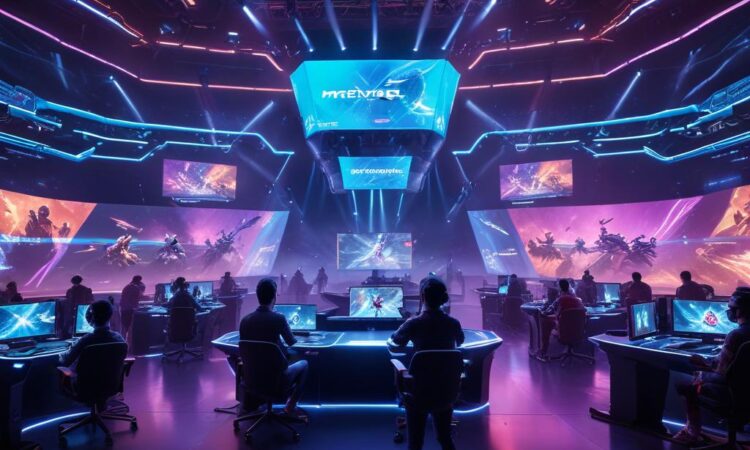The Future of Esports: Metaverse Integration and New Gaming Experiences
The world of esports is rapidly evolving, and the advent of metaverse technology promises to usher in a new era of immersive and engaging gaming experiences. This convergence of virtual reality, augmented reality, and blockchain technology has the potential to revolutionize how we watch, play, and interact with esports. This article delves into the exciting possibilities of metaverse integration in esports, exploring the transformative impact it could have on both players and spectators alike.
The Metaverse: A New Frontier for Esports
The metaverse can be understood as a persistent, shared virtual world where users can interact with each other and digital assets. Unlike traditional gaming platforms, the metaverse offers a truly immersive experience, blurring the lines between the real and virtual worlds. This immersive nature makes it a perfect fit for esports, offering a platform for creating unique and engaging experiences that transcend the limitations of traditional gaming.
Virtual Venues: Beyond the Stadium
Imagine watching a major esports tournament taking place in a virtual stadium, complete with cheering crowds, dynamic lighting, and interactive elements. The metaverse allows for the creation of virtual arenas that replicate the excitement and atmosphere of real-life sporting events, providing spectators with a truly immersive experience. These virtual venues can be designed to accommodate large audiences, exceeding the capacity of any physical stadium, opening up new avenues for fan engagement.
Interactive Spectatorship: Engaging the Audience
The metaverse provides a platform for interactive spectatorship, allowing fans to engage with the game and each other in unprecedented ways. Imagine being able to watch a game from different perspectives, chat with fellow fans in real-time, and even participate in virtual contests. The metaverse allows for the creation of personalized experiences, catering to individual preferences and enhancing the overall viewing experience.
New Gameplay Mechanics: Breaking the Boundaries
The metaverse opens up a world of possibilities for new gameplay mechanics. Imagine esports tournaments taking place in virtual environments where players can utilize unique abilities and interact with the environment in ways not possible in traditional games. This level of immersion can lead to more strategic and unpredictable gameplay, adding another layer of complexity and excitement to esports events.
The Rise of Decentralized Esports
Blockchain technology, often associated with the metaverse, can play a crucial role in revolutionizing esports by introducing decentralization. This means that ownership and governance of esports assets and platforms can be distributed among players and fans, empowering them to participate in decision-making and benefit from the growth of the industry.
Implications for the Future of Esports
The integration of metaverse technology into esports has profound implications for the future of the industry. These include:
Increased Accessibility and Engagement
The metaverse removes geographical barriers, allowing players and fans from all over the world to participate in esports events and communities. This increased accessibility can lead to a wider audience and broader participation, further fueling the growth of esports.
Enhanced Revenue Streams
The metaverse opens up new revenue streams for esports organizations. Virtual assets, including skins, characters, and game items, can be traded and monetized within the metaverse, creating new opportunities for players, fans, and developers to generate revenue.
New Business Models
The decentralized nature of the metaverse encourages the development of new business models for esports. Platforms built on blockchain technology can offer transparent and decentralized governance, empowering communities and fostering greater collaboration and innovation.
The Rise of the Metaverse Athlete
The metaverse can create new opportunities for professional esports players. Players can develop unique avatars and personalities within the metaverse, attracting sponsorships and endorsements from brands looking to connect with the virtual world.
Challenges and Considerations
While the integration of metaverse technology holds immense potential for esports, it also presents a number of challenges and considerations:
Technical Barriers
The development and implementation of metaverse technology for esports require significant technical expertise and resources. Building immersive virtual worlds, ensuring smooth gameplay, and mitigating potential security risks are all significant challenges that need to be addressed.
User Adoption
The success of metaverse integration in esports hinges on user adoption. To attract players and fans, the technology needs to be user-friendly, accessible, and offer compelling experiences that justify the transition from traditional gaming platforms.
Regulation and Standardization
As the metaverse evolves, regulatory frameworks and standards need to be established to ensure fair play, protect user privacy, and prevent exploitation. This requires collaboration between governments, industry leaders, and esports organizations.
Looking Ahead: A New Era of Esports
The integration of metaverse technology represents a significant turning point for esports. It promises to revolutionize how we watch, play, and interact with esports, ushering in a new era of immersive and engaging experiences. While challenges remain, the potential benefits of metaverse integration are too significant to ignore. As the metaverse continues to evolve, esports is poised to become an even more vibrant and exciting industry, captivating audiences and pushing the boundaries of gaming entertainment.

